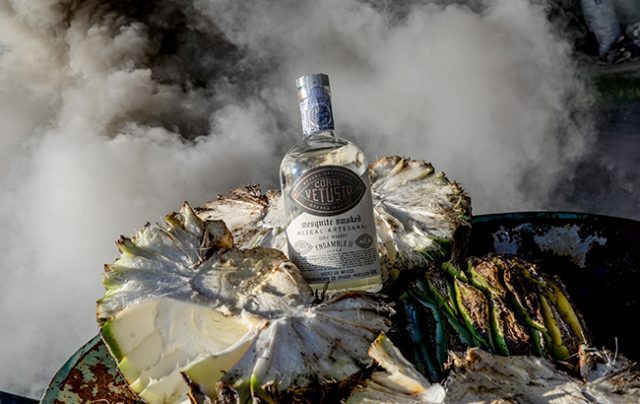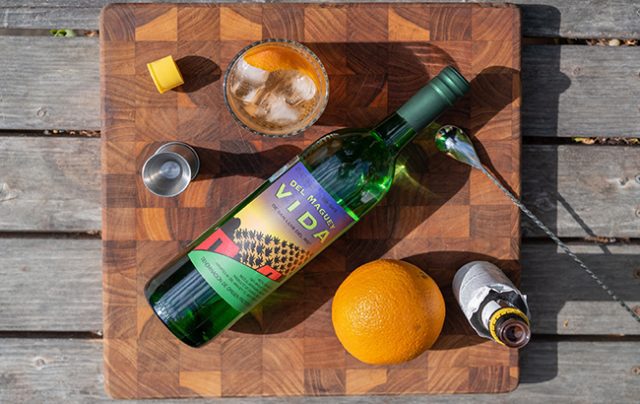Mezcal regulators allow ‘greater competition’
The evolution of the main certifying body for mezcal has highlighted the flux in the category, with new regulators being created and big players entering the space. As the drink becomes increasingly popular, Clinton Cawood asks what’s next.

*This feature was originally published in the February 2022 issue of The Spirits Business magazine.
Mezcal is doing great. The Mexican spirit is growing fast, and steadily becoming more premium as it does so. There’s growing interest, and greater education about the category. But with that success has come a number of challenges.
On the surface, there are the practical considerations resulting from this increased demand to deal with, raising issues of sustainability. The biggest global spirits players are becoming increasingly involved, with all of the pros and cons that brings. Meanwhile, there’s been no small amount of politics to contend with, and changes in how its spirits are certified. And then just the small matter of a global pandemic.
In terms of sales, this is a small spirits category that’s doing significantly better than most. Taking the pandemic into account, figures from IWSR Drinks Market Analysis show a 2020 decline of 7.2% in volume, but an increase of 2.2% in value. IWSR predicts volume and value growth of 8.8% and 12%, respectively, CAGR (compound annual growth rate) 2021‐2025. In the US, mezcal’s biggest export market, 2020 was a good year. Volumes grew by 14.5% and value by 19.1%.
As Jon Darby, founder of Sin Gusano, puts it: “If we assume the situation of rapidly increasing sales is a good thing, then the category has been performing very well.”
Driving force
Many would argue that mezcal’s main strength – the driving force behind this growth – is the liquid itself. “The depth and variety of flavour within mezcal undoubtedly adds to its growing popularity,” says Tanya Clarke, CEO of The Lost Explorer Mezcal Company. “People are starting to understand the complexity of the category, and that mezcal is much more than just Tequila’s smoky cousin.”
These inherent qualities mean there isn’t the same drive as in other categories to create new styles and expressions. Darby, who spends half of his year in Oaxaca, says: “I can’t say I’ve seen any particular innovation among the independent family producers we visit and source from regularly. They’ve been slowly honing their craft for generations, working with the local ingredients and technologies available to them.”
Corte Vetusto founder David Shepherd reports growing interest in wild agaves, but also in blends, or ensambles. “For us they’re the most interesting and sustainable route forward for mezcal,” he says. “They allow us to honour the traditional production practices, whereby mezcal was made with whichever agave was mature at the time, as well as incorporating the stunning flavours from wild agave, but in a more considered way.”
Sustainability is a key word in mezcal, and one with many facets when it comes to the category, from the environmental kind that Shepherd references, all the way to the sustainability of the category itself.
“An emphasis on sustainability is emerging as interest in wild agaves continues to grow,” confirms Mark Makin, enterprise brands controller at Pernod Ricard UK.
“For over three decades, our focus has continued to be on preserving the culture of the artisan families that handcraft Del Maguey, and protecting its traditional methods of production, including the social sustainability of the villages we work in, the environmental sustainability of the land they live and work on, and the agronomic sustainability of the plant and the land it grows in,” he adds.
For Carlos Moreno, founder of Koch El Mezcal, green considerations are vital. He describes a number of practices at Koch to stop deforestation, and to preserve biodiversity, as well as the upcycling of by‐products and the use of organic cultivation. But when it comes to sustainability, there’s also tradition and culture to take into account. “We are committed to preserving mezcal culture by communicating what we are always learning from our mezcal guardians, our producers,” says Moreno.
“Sustainability is paramount,” agrees Juanito Martínez Santiago, president of mezcal certifying body Amma (Asociación de Maguey y Mezcal Artesanal). “We, the mezcaleros, have dedicated ourselves to this activity for many generations – it is in our interest to preserve our environment, in addition to our traditions.”

Promote and protect
This is something to consider in the context of the growing involvement of multinational spirits companies in the category. According to Jorge Vera, president of the Cluster of Mezcal Oaxaca, a group of brands working to promote and protect the category, these represent more than 75% of the production and marketing of the category.
“This has many implications,” says Vera, saying that smaller players can’t compete with these large companies. “The trend towards concentration continues towards a few brands, as it has happened with Tequila,” he adds.
Clark can see the potential benefits, with some caveats. “Investment in the category is a good thing, as long as the community that produces the mezcal benefits from this investment and growth too,” she says.
Eduardo Gomez, founder of Tequila and Mezcal Fest in the UK, also acknowledges the upsides. “It is understandable that big brands are interested in the space, and their acquisitions shine a greater spotlight on an already hot category,” he says. “It can only help grow awareness of mezcal. So as long as it’s an authentic product we’re all for it.”
In terms of shining a spotlight on mezcal, many in the trade acknowledge the role that the on‐trade has played. “We respect and cherish all the creativity and talent of bartenders who play a main role in promoting the mezcal category directly to consumers,” adds Moreno.
Paola Bridge‐Collyns, senior brand ambassador for the agave portfolio of Indie Brands, now part of Rooster Rojo Tequila owner Amber Beverage Group, agrees: “Mezcal has become a favourite for bartenders, and they’re principal to opening up interest in agave spirits. They present different ways of drinking mezcal and show what it can offer in terms of flavour.”
These different ways of drinking mezcal – cocktails in particular – are key, according to some. Michael Cloke, co‐founder of Ojo de Dios Mezcal, is one, saying: “Mezcal is all about exploration, with a wide variety of styles, agaves and regions to enjoy. Cocktails are at the forefront of this discovery.”
The Lost Explorer’s Clarke says: “We’re seeing mezcal make its way onto cocktail menus all around the world. Bartenders are especially excited to dive into a whole new world of possibilities.”
This has been curtailed by the Covid‐19 pandemic. “There’s been a huge shift towards at‐home cocktails, and the category is benefitting from this,” says Makin, who reports a significant increase in direct‐to‐ consumer sales.
Shepherd, who recently launched Corte Vetusto in this channel in the US through the Speakeasy Co platform, agrees: “Direct‐to‐consumer is critical to our future.”

But Covid‐19 might not have been the category’s biggest concern recently, with some major changes to how mezcals are certified.
As Gomez puts it: “Last year was a difficult year for the mezcal DO [denomination of origin] because of internal changes and politics.”
In brief, the monopoly held by the CRM, mezcal’s certifying body, no longer exists, due to a process that many have described as “chaos”. But the dust appears to be settling, and there are now five bodies that can issue holograms and export certificates. Two are based in Oaxaca, two in Michoacán, and one in Mexico City.
“For years, many people indicated their dissatisfaction with the certification of mezcal by a single body, its processes and especially the prices,” says Santiago, president of the fifth to be accredited, Amma. “With the participation of five certifying bodies, the interested party can choose between them. There is no longer an excuse for not certifying mezcal.”
Shepherd says: “The monopoly they had was unhealthy, and to the detriment of certain regions, smaller brands and the category as a whole. Opening it up to other bodies should introduce greater competition, reduce costs and speed up cumbersome sign‐off and approvals.”
Cynthia Villalobos, founder of Aventureros del Mezcal, is similarly optimistic. “From my perspective, the impact is positive given that competition generates better service, in addition to the fact that this has forced lower certification costs, which opens the possibility for small producers to access this certification.”
Vera agrees. “This competition will focus on who offers greater trust and reliability in the traceability and compliance with the NOM [mezcal’s regulations],” he says. “The great challenge now is to offer a quality, reliable service at the best cost.”
Impossible task
For some, there are still questions regarding the limitations of the denomination of origin in general.
As Darby explains: “The size and diversity of Mexico makes it impossible to cover with the DO structure as it is. Mezcal that can be currently certified for export by no means covers the variety of the agave spirits made in the country.”
“The regulations are limiting,” agrees Bridge‐Collyns. “Outside of the DO, they’re not able to be called mezcal. We’re missing a part of the essence of that agave world.” Questions like these, as well as ongoing considerations regarding sustainability, will no doubt continue to be important in the years to come, as the category’s popularity continues to grow.
As Bridge‐Collyns succinctly puts it: “Mezcal is precious and fragile, and needs protection.”
Related news
Cocktail stories: Speed Bump, Byrdi
